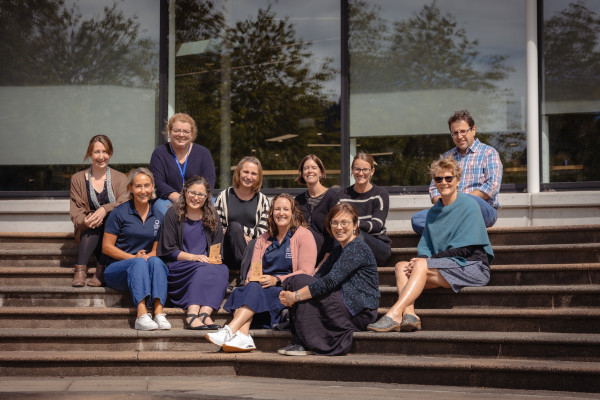- Tūhono home Hoki ki Tūhono
-
- Staff Directory
- Chief Executive Office Auckland International Office Corporate Services Finance Campus Services Functions and Catering Information Systems and Support Marketing, Communications and Engagement Learner Journey Academic Registry International Learner Services Te Punaka Ōwheo
- Learner Experience Academic Excellence Central Campus College of Community Development and Personal Wellbeing College of Engineering, Construction and Living Sciences College of Health College of Work Based Learning Open Education Resource/OERu Research and Postgraduate Studies Te Maru Pumanawa | College of Creative Practice and Enterprise
- Māori Development and Kaitohutohu Office People, Culture & Safety People and Culture Childcare Centre Te Ama Ako | Learning and Teaching Development Wellbeing and Safety Auckland Staff Directory Executive Office Academic Corporate Services Marketing and Business Development Human Resources Campus Quality and Programme Development
-
 Our people make a better world
Our people make a better world
We build the capabilities of individuals, organisations and communities and help them to realise their potential.
Staff Directory
-
- Tools
- Academic Integrity Declaration Form AIC Applications Dashboard Approved Programmes Approved Programme Fees Centralised Assessement Repository Chemwatch CMS - Tūhono & StudentHub updates Course Evaluation and Surveys CRM Applications CRM customer service hub Delegations policy/process Disability and Neurodiversity Dynamics 365 (CRM) EBS Ontrack EBS Report Email Security Personal Portal Employment Matters / Solarworkplace / Performance Reviews eTaxi eTV
- Financial Variance Reporting Hidden Disabilities Sunflower programme FCM travel intranet InPlace International entry requirements Knowledgebase articles Learner Capability Learner Support Dashboards Linkedin Learning Log a job with Marketing Login as an applicant Microsoft 365 Moderation App Moodle OP Docs OP Docs - Publishing OP Image Libraries Performance Excellence Portal Product Evaluation Panel
- Policy Library Privacy Programme and Course Design and Development Qualtrics XM RDS Remote Access Support Portal Research Database Robertson Library Staff FAQs about Graduation Status of Programmes Student Hub (Kāpehu demonstration view) Study Abroad info for learners Tūhauora I Wellbeing resources Uniprint Vault Webexpenses Auckland Tools
-
 Vault
Had an accident or near miss?
Log it here
Vault
Had an accident or near miss?
Log it here
-
- Communities
- Community AI Steering Committee Ally Network EBS Community of Interest EdTech Champions Health & Wellbeing Research Internal Evaluation Neurodiversity Professional Team Professoriate Proud@OP Student Support Website Advisory Group Web Champions Working under the Rainbow Project Learner Capability Trade Training Centre
- Committee Academic Committee Animals@OP Diversity and Equity Doctor of Professional Practice Committee Kaunihera Whakahaere - Leadership Council Internal Evaluation Learning & Teaching Leadership Team Library Committee Mental Health and Wellbeing Advisory Group Otago Polytechnic Board of Directors Pastoral Care Code Committee Programme Approvals Committee Research and Postgraduate Committee Research Ethics Committee Staff Subcommittee
- Think Tanks Mātauraka Our learners achieve educational success Pūtea Our financial success Tākata Our people, our team, our community Tiriti Our active commitment as a Treaty partner Tūroa Our commitment to be a sustainable and responsive organisation
-
 Create a community
Create a community
Do you have a community, committee or project that you'd like represented here?
Communities
-
- About OP
- Keep up to date All news All events All notices All blogs Share your info Create a news article Create an event Create a notice Create a blog
- Community and Partnerships Alumni and friends Education Foundation Operational information Academic calendar 2025 Academic calendar 2026 Current vacancies Dunedin campus map Our policies Topical FAQs
- Who we are Commemorative sites Māori Strategic Framework Our history Our strategic priorities Pasifika Strategic Framework (2025-2030) Vision and Values Working for us OP job opportunities Wellbeing Calendar Working at OP
-
New Zealand: 0800 762 786
contact us
International: +64 3 477 3014
Understanding occupational therapists' use of acceptance and commitment therapy in New Zealand
Author: Dominique du Toit
Supervisors: Linda Robertson
20 July 2023
du Toit, D. (2023). Understanding occupational therapists' use of acceptance and commitment therapy in New Zealand. (Unpublished document submitted in partial fulfilment of the requirements for the degree of Master of Occupational Therapy). Otago Polytechnic | Te Pūkenga, New Zealand. https://doi.org/10.34074/thes.6515
Abstract
Acceptance and commitment therapy is a gold standard third wave behaviour therapy effective in treating a range of conditions including depression, anxiety, phobias, schizophrenia and pain, yet there is little empirical research supporting its use by occupational therapists. Acceptance and commitment therapy aims to increase engagement in meaningful activities in a strengths-based non-judgmental way. It combines talk therapy with real world skills building. Importantly in a New Zealand context, there is evidence to suggest that acceptance and commitment therapy is able to work well alongside indigenous models of health to improve equitable outcomes. Anecdotally there is much support for its use by occupational therapists.
However, occupational therapy interventions are research informed and therefore research is needed to demonstrate effectiveness within the occupational therapy paradigm. The current research is a mixed methods study incorporating surveys and focus groups to gather qualitative and quantitative data. The goal of the research was to ascertain whether New Zealand occupational therapists believe that acceptance and commitment therapy is congruent with occupational therapy, including a clear clinical rational as to their answer. Occupational therapists who engaged in this research identified a range of theoretical underpinnings, such as the importance of context and flexibility within assessment and intervention, shared between ACT and occupational therapy. They also identified and were able to identify ACT processes and interventions useful within an occupational therapy perspective, including metaphors, values-guided meaningful occupation, doing-based interventions, and mindfulness.
The outcomes of this research support tertiary institutions and workplaces to fund this gold standard treatment as part of an occupational therapist’s toolkit.
Keywords
Acceptance and Commitment Therapy, occupational therapy, behaviour therapy, New Zealand
License
A copy of the thesis is publicly available under a Creative Commons Attribution Non-Commercial No Derivatives licence CC BY-NC-ND 4.0 International
This licence applies except where otherwise indicated, especially for images.
![]()